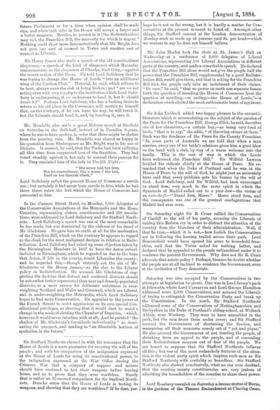In the Cannon Street Hotel, on Monday, 1,000 delegates of
the Conservative Associations of the Metropolis and the Home Counties, representing sixteen constituencies and 298 associa- tions, were addressed by Lord Salisbury and Sir Stafford North- cote. Lord Salisbury's speech was one of the most remarkable he has made, but was dominated by the violence of his dread of Mr. Gladstone. He gave him no credit at all for the moderation of the Franchise Bill, which on the contrary he appears to regard as the cloak for the most malignant designs in relation to Redis- tribution. Lord Salisbury had raked up some objection taken by the Birmingham Members in 1867 to have the Aston suburb included in Birmingham, which be regarded as due to the hope that Aston, if left in the county, would Liberalise the county ; and he regarded this,—though certainly not the sin of Mr. Gladstone or Sir Henry James,—as the clue to the Liberal policy in Redistribution. He accused Mr. Gladstone of sug- gesting the doctrine that distant and scattered districts should be eomewhat better represented than near and densely-populated districts, as a mere excuse for deliberate unfairness in over- weighting Scotland and Wales and Cornwall, which are Liberal, and in under-weighting the Metropolis, which Lord Salisbury hopes to find more Conservative. He appealed to the power of the French Senate to resist aggressions on its own special Con- stitutional privileges, as showing that it would dare to resist a change in the mode of electing the Chamber of Deputies,—which, however, it would never interfere with at all. And he painted "the shadow of Mr. Gladstone's formidable individuality" as domi- nating the prospect, and tending to "an illimitable horizon of spoliation in the future."


































 Previous page
Previous page